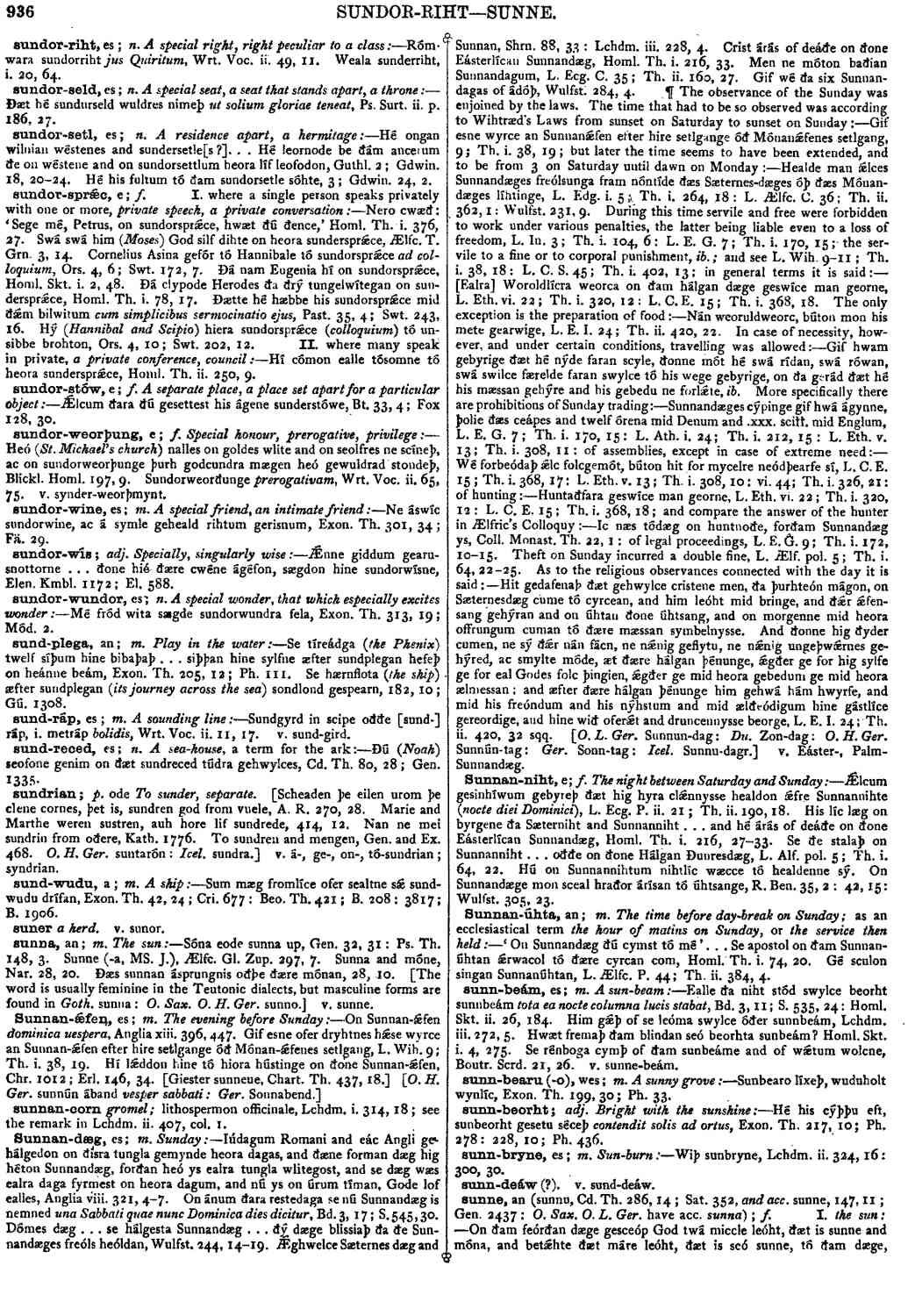Sunnan-dæg
- noun [ masculine ]
- Iúdagum Romani and eác Angli gehálgedon on ðisra tungla gemynde heora dagas, and ðæne forman dæg hig héton Sunnandæg, forðan heó ys ealra tungla wlitegost, and se dæg wæs ealra daga fyrmest on heora dagum, and nú ys on úrum tíman, Gode lof ealles, Anglia viii. 321, 4-7.
- On ánum ðara restedaga se nú Sunnandæg is nemned una Sabbati quae nunc Dominica dies dicitur, Bd. 3, 17; S. 545, 30. Dómes dæg ... se hálgesta Sunnandæg ... ðý dæge blissiaþ ða ðe Sunnandæges freóls heóldan, Wulfst. 244, 14-19. Ǽghwelce Sæternes dæg and Sunnan, Shrn. 88, 33: Lchdm. iii. 228, 4. Crist árás of deáðe on ðone Eásterlícan Sunnandæg, Homl. Th. i. 216, 33. Men ne móton baðian Sunnandagum, L. Ecg. C. 35; Th. ii. 160, 27. Gif wé ða six Sunnandagas of ádóþ, Wulfst. 284, 4.
-
Gif esne wyrce an Sunnanǽfen efter hire setlgange óð Mónanǽfenes setlgang,
- 9; Th. i. 38, 19;
-
During this time servile and free were forbidden to work under various penalties, the latter being liable even to a loss of freedom, L. In. 3; Th. i. 104, 6: L. E. G. 7; Th. i. 170, 15; the servile to a fine or to corporal punishment,
ib.;
and see- L. Wih. 9-11; Th. i. 38, 18: L. C. S. 45; Th. i. 402, 13; in
- The only exception is the preparation of food
Nán weoruldweorc, búton mon his mete gearwige,
- L. E. I. 24; Th. ii. 420, 22.
- In case of necessity, however, and under certain conditions, travelling was allowed
Gif hwam gebyrige ðæt hé nýde faran scyle, ðonne mót hé swá rídan, swá rówan, swá swilce færelde faran swylce tó his wege gebyrige, on ða gerád ðæt hé his mæssan gebýre and his gebedu ne forlǽte, ib.
-
Sunnandæges cýpinge gif hwá ágynne, þolie ðæs ceápes and twelf órena mid Denum and .xxx. sciłł. mid Englum,
- L. E. G. 7; Th. i. 170, 15: L. Ath. i. 24; Th. i. 212, 15: L. Eth. v. 13; Th. i. 308, 11:
- Wé forbeódaþ ǽlc folcgemót, búton hit for mycelre neódþearfe sí, L. C. E. 15; Th. i. 368, 17: L. Eth. v. 13; Th. i. 308, 10: vi. 44; Th. i. 326, 21:
- Huntaðfara geswíce man georne, L. Eth. vi. 22; Th. i. 320, 12: L. C. E. 15; Th. i. 368, 18;
- Ic næs tódæg on huntnoðe, forðam Sunnandæg ys, Coll. Monast. Th. 22, 1:
- L. Ælf. pol. 5; Th. i. 64, 22-25.
-
Hit gedafenaþ ðæt gehwylce cristene men, ða þurhteón mágon, on Sæternesdæg cume tó cyrcean, and him leóht mid bringe, and ðǽr ǽfen*-*sang gehýran and on úhtan ðone úhtsang, and on morgenne mid heora offrungum cuman tó ðære mæssan symbelnysse. And ðonne hig ðyder cumen, ne sý ðǽr nán fácn, ne nǽnig geflytu, ne nǽnig ungeþwǽrnes gehýred, ac smylte móde, æt ðære hálgan þénunge, ǽgðer ge for hig sylfe ge for eal Godes folc þingien, ǽgðer ge mid heora gebedum ge mid heora ælmessan; and æfter ðære hálgan þénunge him gehwá hám hwyrfe, and mid his freóndum and his nýhstum and mid ælðeódigum hine gástlíce gereordige, and hine wið oferǽt and druncennysse beorge,
- L. E. I. 24; Th. ii. 420, 32 sqq.
Bosworth, Joseph. “Sunnan-dæg.” In An Anglo-Saxon Dictionary Online, edited by Thomas Northcote Toller, Christ Sean, and Ondřej Tichy. Prague: Faculty of Arts, Charles University, 2014. https://bosworthtoller.com/29388.
Checked: 0